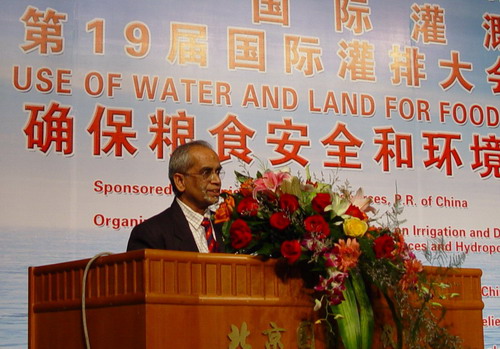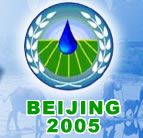(中国水科院 9月18日北京报道) 第19届国际灌排大会暨第56届国际执行理事会于18日下午在京闭幕,闭幕式上ICID秘书长戈派拉克瑞斯南宣布了《北京宣言》。

ICID秘书长戈派拉克瑞斯南宣读《北京宣言》
The Beijing Declaration
September 2005
Delegates of the International Commission on Irrigation and Drainage (ICID) from 56 countries met in Beijing during the 19th ICID Congress to focus on the theme of “Use of Water and Land for Food Security and Environmental Sustainability”.
In due consideration to the principles of Sustainable Development and in line with the decisions of the World Summit on Sustainable Development, calling on countries to develop Integrated Water Resources Management (IWRM) and water efficiency plans by 2005 and to achieve water efficiency for sustainable food security for all people;
Recognizing that the progress achieved in regard to the Millennium Development Goals (MDG) for halving the world poverty and hunger by 2015 has not been satisfactory and the dire need for vigorous action in the coming decades will be urgently required to avert world crisis;
Noting that irrigation in the world today accounts for 70% of all fresh water withdrawals, which are used to irrigate 17% of all cropped land yielding 40% of the overall agricultural outputs worldwide;
Considering that ICID has made the commitment to take its message to the World Water Fora;
Therefore, ICID member countries attending the 19th Congress make the following Declarations and Recommendations for the attention of world leaders and decision makers:
ICID has formulated its position towards the challenges in four position papers, being: (i) Global Issues Related to Food Production, Security and Trade; (ii) Irrigation and Drainage Services - Some Principles and Issues Towards Sustainability; (iii) Country Policy Support Program (CPSP); (iv) Promoting Appropriate Decision-Making Procedures for New Dams, particularly for Irrigation, Drainage and Flood Management. Through its workbodies, congresses and conferences, it promotes improved water management practices in support of food production, livelihood in rural areas and environmental sustainability. The commission disseminates its messages through its network: its website www.icid.org, its Journal Irrigation and Drainage and its Congress and Conference Proceedings. The key to increase future food production lies in expansion of irrigated and drained lands where potential exists, better water and land management in existing irrigated and drained areas and in increase in water use efficiency and land productivity. Even while acknowledging the best efforts to achieve a control in the growth trend, the needs of over eight hundred million people by 2025 are still to be met. Despite an apparent sufficiency in the world food production, the inequity and the problem of malnutrition in Least Developed Countries persist and about 20% of the world’s poor people still starve or are underfed. The global food production will have to be doubled to achieve satisfactory food security for all. Irrigation will play a greater and dependable role in meeting future food demands than in the past. The goal shall be to achieve ‘Grow More Food with Less Drops’. This will be feasible with the advancement in technology, modernization, better management of irrigation and, where applicable, drainage systems. Further efforts to explore ways to produce more food with less water under sustainable conditions would have to continue through Research and Development, Capacity Building and spread of Technology. Fresh water resources are being stretched to their limits in several regions and countries which calls for an utmost consideration of efficient use so as to safeguard environmental security. IWRM shall be the key in such cases. Given the need of the least developed countries where there is population pressure and an increased food requirement, installation of small-scale, low-cost irrigation and/or drainage systems in cultivated lands without such systems so far will have to be seriously considered. In addition, potential land for cultivation may have to be reclaimed. Increasing the water storage capacity for food production and the investment needs in such cases deserve priority. The resources will be required to be exploited in a sensitive manner with due consideration of environmental sustainability.
·The dire challenge to professionals working in the field of irrigation, drainage and flood control lies in their ability to design, operate and maintain a new generation of efficient water management systems, while sustaining ecosystems and the environment. Integrated approaches in the sector should bring in not only scientific and technical but also the socio-economical and environmental aspects.
·Increasing population has led to the settlement in and cultivation of flood prone areas resulting in increased emphasis on flood management in many regions, particularly South and East Asia. This region has a population of over 2.9 billion, which is nearly half of that of the world. It is estimated that about 80% of the population will live in flood prone areas by 2050. In addition to heavy rainfall and floods, huge man-induced changes such as uncontrolled land reclamation and inadequate land use planning, may increase the vulnerability of flood prone areas. An integrated flood management approach including structural and non-structural measures based on risk management principles with public participation is required to mitigate losses due to flood hazards. It is noted that living in harmony with Nature is essential to managing floods.
·Financial allocation for development or operation and maintenance of existing irrigation and drainage systems has not been adequate for many existing water management systems, bringing such systems in danger of being unable to perform their function. Low water prices and inappropriate management are also causes of low water use efficiency and waterlogging and soil salinity. Institutional reforms in the public sector and emergence of professionally managed community based organisations will enhance the efficiency and effectiveness of water and land rights, appropriate legal and institutional framework and better performance measures and assessments.
·Inter-sectoral and in some cases regional competition for water are factors of major concern and have to be resolved by objective studies which can provide useful Country Policy Support indicators. Interdisciplinary efforts to comprehensively address water assessment can help to promote a better trade off in case of conflicts





